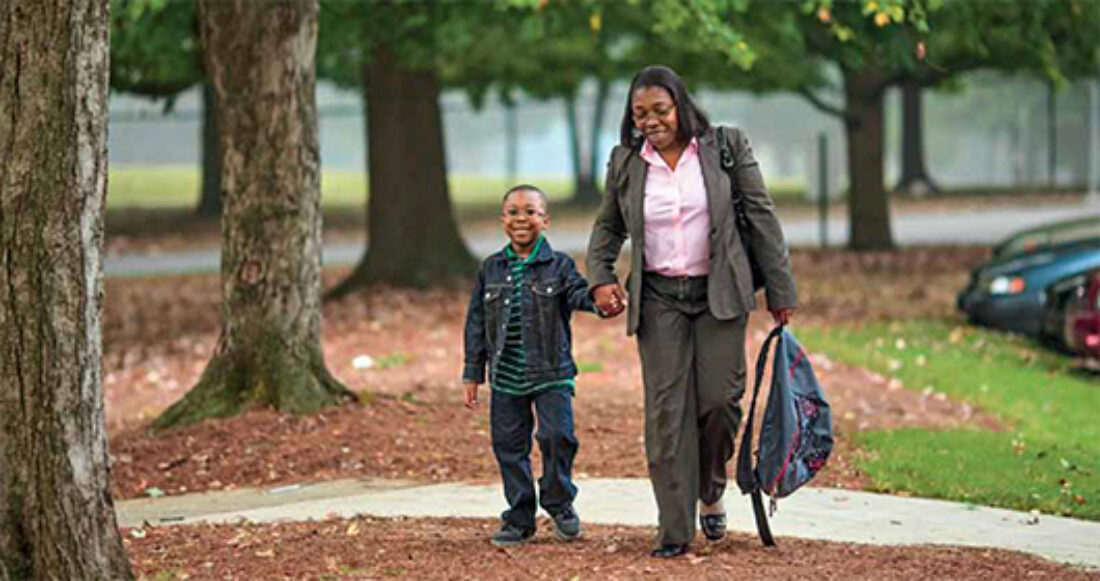Two Generations Benefit From Community Efforts in Atlanta

Marilyn Winn relishes her job helping people work toward better jobs and futures at The Center for Working Families, Inc., in Atlanta. “I like engaging with the participants because I remember where I was and what it took to get me here,” says Winn.
Winn was struggling to overcome addiction and a criminal background when she enrolled at the center in 2005. Today, she works there as a program associate.
“When I got here, I had the willingness to change, but I didn’t know how to present myself to an employer, how to talk and act, how to do my resume or my job application,” reflects Winn. “I wanted someone to get me a job, but even if they did, could I maintain it? You have to work to build a work ethic and show up every day. No job is a dead end because you can always build from it and move on.”
Atlanta is one of two civic sites, along with Baltimore, where the Casey Foundation has a special connection and long-term commitment to child and family well-being. Casey’s investment in Atlanta, headquarters to UPS and the Foundation’s Board of Trustees, focuses on five southwest Atlanta neighborhoods where children and families face myriad obstacles in living the American Dream. Challenges include high rates of poverty, employment barriers and a foreclosure crisis that has whittled away the housing stock.
The Atlanta Civic Site is helping support organizations like the center as part of a two-generation strategy to address parents’ and children’s challenges simultaneously to break the cycle of poverty that often passes from generation to generation. While parents hone their workforce skills, many of their children attend a state-of-the-art learning complex that is helping them reach the critical milestone of reading on grade level by the end of third grade.
Recognizing that families cannot thrive without safe and affordable places to live, the civic site is also partnering with other area funders, community development organizations and resident groups in a community-generated revitalization plan. In 2006, Casey purchased 31 acres of land in Atlanta’s Pittsburgh neighborhood and set up a process to involve residents in plans to develop the property, attract businesses and stimulate the local economy. With the collapse of the housing market in 2008, those plans had to be tabled, but 18 homes have since been rehabilitated and the master plan has been redrawn to develop more affordable rental housing and pave the way for future commercial development.
“We have a strong master plan and a good start, and each of the rehabbed homes provides beautiful, energy-efficient housing for working families,” notes Gail Hayes, director of the Atlanta Civic Site. About half of these homes are now occupied by Center for Working Families participants.
Parents Working, Children Learning

The center moves participants toward self-sufficiency through three tracks: moving to work, moving to wealth and moving to entrepreneurship. These programs encompass job readiness and employment training, career and job search guidance, financial planning and assistance in accessing benefits and developing business plans and microenterprises. Participants also get referrals for help in overcoming barriers from mental health issues to child care.
The center’s classes, coaching and basic skill development helped Marilyn Winn land a job with a staffing agency. “I got more experience and skills under my belt, was never late and never took off in three and a half years,” says Winn, who has been working at the center since 2011. Her advocacy skills have also helped her mount a successful campaign to ease discrimination against ex-offenders applying for city jobs and earned her a spot on the board of a national organization with similar goals.
Since 2005, the center has placed participants in 1,500 jobs and connected 6,052 residents with benefits that added a total of $5,628,258 to their incomes to help them make ends meet. In addition, its free tax preparation program has helped more than 1,000 people access the Earned Income Tax Credit and receive a total of $6,022,914. In 2012, the center launched a new model that targets its most intensive services at participants who complete an employment “boot camp” and follow through with further training. “We instill that you have to demonstrate your intent through your actions,” notes David A. Jackson, president and chief executive officer of the center.
The center also leads Atlanta’s Green and Healthy Homes Initiative. It trains low-income residents for jobs rehabilitating low-income homes to make them more energy-efficient and reduce environmental pollutants that cause health problems.
While participants prepare for success in the workplace, many of their children are preparing for success in school — and life — at the Early Learning and Literacy Resource Center (ELLRC). The ELLRC is a part of the Dunbar Learning Complex, which also includes Dunbar Elementary School. About 80 percent of the children enrolled in the ELLRC have parents at the Center for Working Families. Having high quality subsidized care has bolstered parents’ productivity, reaping a 33 percent increase in employment and a mean weekly wage increase of $35. Stephanie Flowers, a parent outreach coordinator at the ELLRC, had struggled to find child care for her son Marcus before the ELLRC opened. Marcus, who was in the first group of 3‑year-old children to participate in 2010, is now in first grade. “I know he would not be where he is now” without the multiple services the Dunbar complex offers, says Flowers. “It has really developed a love of learning in him.”
While Marcus was learning, Flowers, a longtime resident of the civic site’s target neighborhoods, took classes offered by the Center for Working Families that helped her budget and plan for the future. She now helps parents to access services and advocate for community improvements, such as healthier and more affordable food shopping options. “We have to keep the families front and center and continually ask: are they better off?” she says.
Preparing Children to Prosper
In consultation with residents and national experts, the civic site partnered with the Atlanta Public Schools and the Sheltering Arms Early Education and Family Centers to design a full-service learning complex serving children 6‑weeksold through fifth grade. With a goal of ensuring that children read proficiently by the end of third grade, ELLRC and elementary teachers receive joint training from the Rollins Center for Language and Literacy and work together to help children transition from preschool to school. The young children and their parents have opportunities to visit the school classrooms and get to know the teachers, and the complex runs a summer camp for preschoolers entering kindergarten.
“We have two sets of teachers working together who understand the early learning curriculum and the K–5 curriculum,” says Dunbar Elementary School Principal Karen Brown Collier.
“The curricula are aligned so children are prepared for what they are going to receive, and we assess their skills and document what we are doing to help each child meet milestones,” says Steven White, director of the ELLRC. “In a community that has been underserved for a long time, our parents are happy with the services they are receiving, and our attendance is through the roof.”
To address the significant percentage of children who come to school with social, emotional and health challenges, teachers are trained in tested methods to promote social and emotional well-being, and a full-time registered nurse works to ensure that children and their families receive needed health services and have insurance and a regular doctor.
A report on the Dunbar complex’s first two years showed that 63 percent of children who had attended the ELLRC were reading on or above grade level when they started kindergarten at Dunbar, compared to only 47 percent who did not attend and only 6 percent before the ELLRC opened. There were also significant gains in vocabulary scores and first grade reading proficiency. In addition, the share of preschoolers up-to-date on immunizations rose to 97 percent while the percentage with a primary care doctor reached 99 percent.
“We’ve brought the right set of partners together who could commit themselves to the goals we have in mind and find the specific things they are really good at to help us reach those goals,” says Leah Austin, director of the civic site’s two-generation strategy.
Rebuilding Pebble by Pebble
Queen La’Rosa Harden Green, a longtime resident of Atlanta’s Pittsburgh neighborhood whose 4‑year-old granddaughter attends the ELLRC, is active in the Preservation of Pittsburgh, a collaboration between the civic site, Sustainable Neighborhood Development Strategies Inc. (a nonprofit supported by Casey) and the Pittsburgh Community Improvement Association. Since the foreclosure crisis, these partners have focused on a large-scale effort to transform vacant properties into affordable, safe and energy-efficient housing and established a land trust to prevent future wealth stripping.
Green lives in one of 18 homes rehabbed as an affordable rental property. But securing the funding to rehab all the homes originally targeted has been challenging, and the civic site is seeking an established real estate developer to help move it forward. Meanwhile, the community has crafted a revitalization plan that, besides more housing, would help residents bring their homes into code compliance, provide more youth activities and employment, offer new playgrounds, institute a “cop on the block” program to increase public safety and launch a food co-op to distribute produce from community gardens.
Green, a former Center for Working Families participant now pursuing a marketing degree at Atlanta Technical College, uses leadership skills she has gained through civic site programs on a daily basis.
“I want to see a ripple effect — to drop one pebble and see it spread all over the community, the state, the country, the world,” reflects Green. “I want to see all these different communities that have been disparaged rise up again like the phoenix.”





